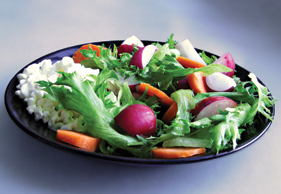DON’T TAKE MOM FOR GRANTED
The impact of a mother’s health on the household diet cannot be overstated, according to research. The main caregiver in a family (usually the mother) needs to be energetic and organised to make healthy eating happen consistently within the family. When the main caregiver is sick, tired or unmotivated, the household diet tends to slide.
BYE-BYE JUICE, HELLO FAT-FREE MILK!
Research has found if you replace your morning juice with a glass of fat-free milk, you will manage your weight better. The study found that a glass of skim milk with your toast or breakfast cereal reduces mid-morning munchies more than a glass of juice does. In fact, milk drinkers ate 10% less food four hours after breakfast than those who drank juice for breakfast. According to the researchers, such a change in appetite could potentially help with weight management.
AVOID TAKE-AWAY TRAPS
If you are a convenience connoisseur, try keeping these three easy tips in mind:
• Sauces are dangerous: A single squirt from a tartar sauce bottle contains about 500kJ. You would need to run at full pace for about 15 minutes to burn this off. On top of this, a take-away burger and chips will often have two or more sauces. You do the maths!
• Portion size: One large portion of chips is too much food for any one person. Half this amount is much more reasonable and half the fat and calories.
• Preparation is important: Sweet and sour pork is prepared by coating high-fat pork in batter, then deep frying it in oil and finally boiling it in sugar (the ‘sweet’ bit). That’s why it’s so energy-dense. Always ask how your food is cooked so you know where the hidden energy is.
BEWARE OF THE ‘HEALTHY HALO’ EFFECT
If a food product says ‘low-fat’, do you eat more? Probably! In a US study, adults were directed to one of two bowls of unusually coloured M&Ms (gold, teal, purple and white) and invited to help themselves. The bowls were labelled either ‘New colours of regular M&Ms’ or ‘New low-fat M&Ms’. On average, people ate 28% more of the supposedly low-fat variety.
In another study, researchers asked participants to estimate suitable serving sizes for M&Ms and muesli. Half the participants were told these were low-fat versions of the food, the others were told they were regular versions. When people saw a food labelled ‘low-fat’, they estimated an appropriate serving size to be 25% bigger.
These studies found that we often assume the energy (kilojoules) content of a food is much less in foods labelled ‘low-fat.’
GET ENOUGH SLEEP
Older people who sleep for less than five hours each night, or for eight to nine hours, are more likely to gain 5kg or more over a two-year period, and more likely to be obese, according to a study in Spain. The researchers analysed the sleeping patterns and body measurements of over 3 500 people aged 60 and older, and found the optimal sleep duration for weight maintenance in this group appeared to be seven hours. So don’t compromise your sleep!


